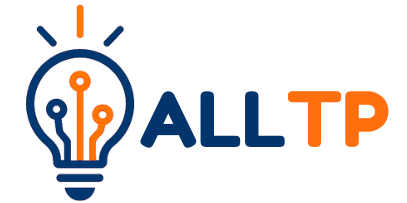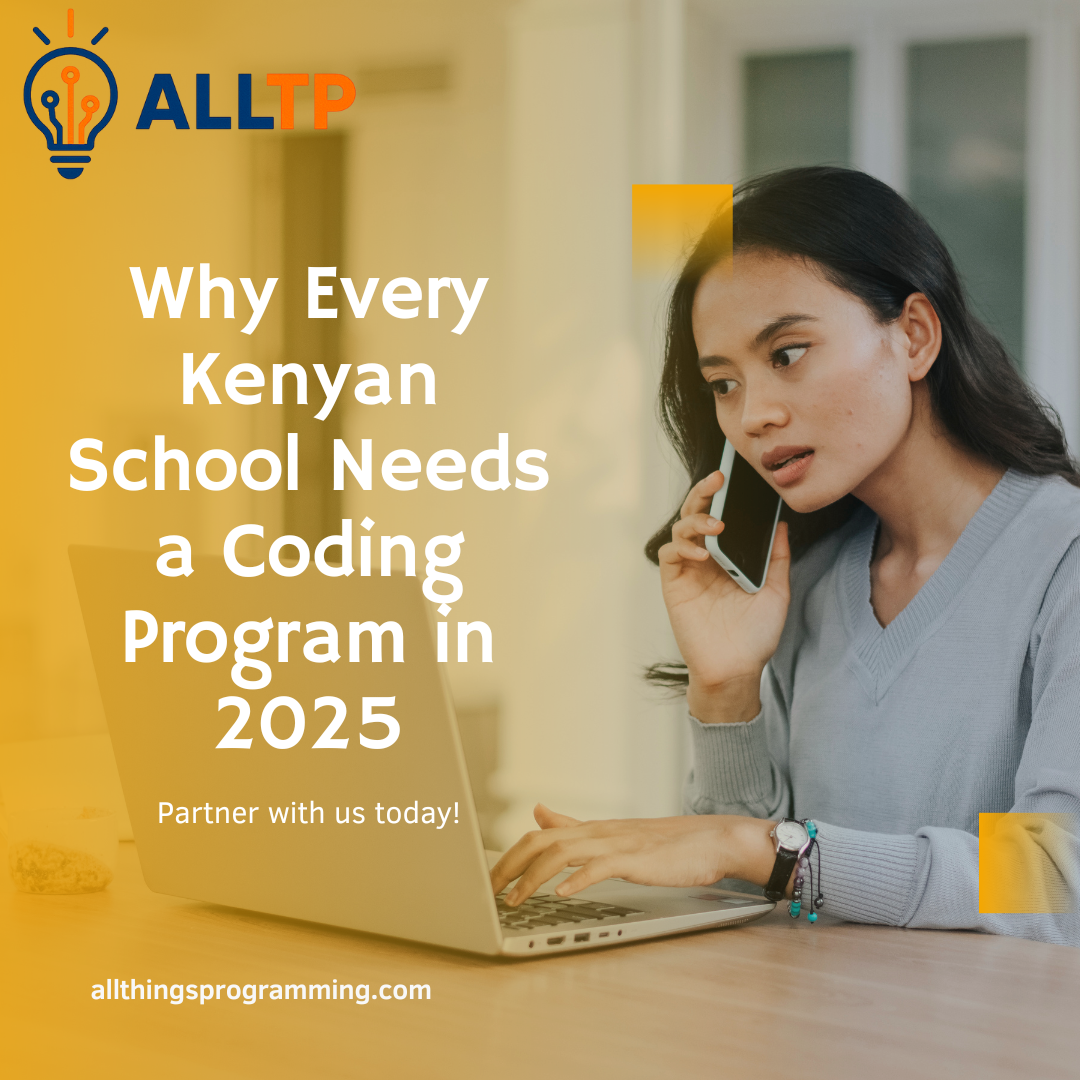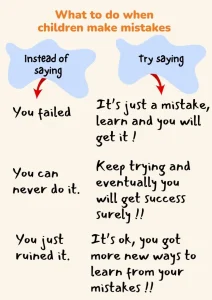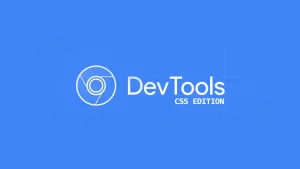Kenya’s education system is changing with the Competency-Based Curriculum (CBC), which focuses on skills over memorization. CBC promotes creativity, collaboration, and practical learning. As the world becomes more digital, Kenyan students need strong coding skills. Coding builds critical thinking and problem-solving abilities essential for the future.
All Things Programming helps schools by offering an affordable coding program designed for Kenya. We provide free teacher training, curriculum resources, and ongoing support, all using existing school technology. This makes coding education easy to implement without extra costs or staff.
School leaders, policymakers, and parents must make coding a core part of education, not an extra. In 2025, digital literacy should be a right for every child.
Through programs like All Things Programming, all Kenyan students can access quality coding education and be ready for tomorrow. Get in touch today to make your school AI, and coding compatible
The Global Shift Toward Coding Literacy
Around the world, education systems recognize coding as a vital skill for all students, not just computer scientists. Countries like the UK, Finland, and the US have made coding a core part of early education. Even developing nations such as India and Rwanda are prioritizing digital skills to drive innovation and jobs.
This push is fueled by AI, automation, and data shaping industries everywhere. As routine tasks become automated, human skills like creativity and digital fluency become crucial. Coding teaches these skills, making it the new literacy for the 21st century.
Kenya must treat coding like reading and math: a universal skill for all children. Programs like All Things Programming help learners move from technology users to creators. By providing practical coding education, All Things Programming prepares students with the digital skills they need to thrive in the future
From building simple apps to advancing through structured programs like Coding Kenya, learners are empowered to move from passive users to active creators of technology. Preparing our learners for the future means giving them the digital skills to create, not just consume, technology.
Why Coding Matters for Kenyan Learners
1. Builds Critical Thinking and Problem-Solving Skills
Coding teaches students how to approach complex problems by breaking them down into smaller, manageable steps. This analytical mindset helps learners become better thinkers in all subjects, not just in tech.
2. Sparks Creativity and Innovation
Whether it’s designing a simple game or building a website, coding encourages creative expression. Students learn to experiment, test ideas, and build their own digital solutions, fostering a culture of innovation.
3. Opens Career Pathways in Tech and Beyond
ICT is one of Kenya’s fastest-growing sectors. Coding provides direct access to jobs in web development, software engineering, and data science. It also supports entrepreneurship and remote freelancing opportunities for youth across the country.
4. Promotes Digital Literacy for the 21st Century
Basic coding helps learners understand how the technology around them works. This strengthens their digital literacy, an essential skill for thriving in any profession today.
5. Aligns Perfectly with the CBC Vision
Coding supports the Competency-Based Curriculum by promoting learner-centred, hands-on education. It emphasizes self-directed learning, collaboration, and real-world application, the core goals of CBC.
Challenges Unique to Kenyan Schools and Solutions
1. Infrastructure Gaps in Rural and Underserved Areas
Many schools, especially in rural Kenya, lack basic digital infrastructure, computers, reliable electricity, and internet access. These limitations make it difficult to implement standard ICT or coding programs.
Solution: Leverage low-cost, offline-friendly tools like Scratch and mobile-based apps. Use solar-powered devices and local computer hubs to reach remote areas.
2. Limited Teacher Training in Coding
Most teachers have not received formal training in coding or digital literacy. This creates uncertainty and reluctance to teach something unfamiliar.
Solution: All Things Programming Provides Free Teacher Training
All Things Programming addresses this gap by offering free, targeted teacher bootcamps, professional development workshops, and online courses designed specifically for Kenyan educators. These trainings build teachers’ confidence and practical skills to effectively deliver coding lessons.
In addition, platforms like Kodris Africa and Google CS First help scale teacher readiness by providing accessible, engaging resources. Kenyan schools can also benefit from research-based programs such as the University of Illinois’s Pritzker Tech Talent Labs, which offers K–14 teacher training in mobile app development and computer science pedagogy. These programs focus on building hands-on classroom capacity and preparing teachers to nurture the next generation of tech-savvy learners.
3. Curriculum Gaps and Lack of Standardization
Many schools lack a structured curriculum or materials aligned with Kenya’s CBC. This creates inconsistency and prevents the nationwide rollout of coding education.
Solution: Adopt open-source and CBC-aligned platforms like Kodris Africa. Partner with KICD-approved providers and NGOs to standardise content delivery across schools.
4. Financial Constraints
Budget limitations can make it difficult for schools to invest in devices, software, and training.
Solution: Explore public-private partnerships, donor funding, and scalable NGO-supported programs that provide access to affordable or subsidized resources.
5. Resistance to Change and Awareness Gaps
Some education stakeholders still view coding as too advanced or unnecessary at the primary or junior secondary level.
Solution: Promote awareness through pilot programs and success stories. Showcase how coding improves student performance and aligns with CBC’s skills-first approach.
Stories from the Ground
1. Mwangaza Junior School (Machakos County)
Located in a semi-rural area, Mwangaza Junior School had limited digital infrastructure and no formal ICT teacher. In 2023, the school partnered with a local NGO to pilot a coding program using Scratch and Kodris Africa.
Impact:
- Integrated coding into Grades 6–8 science and math lessons
- Increased student engagement and improved problem-solving in mathematics
- Sparked interest in technology among both boys and girls
2. Teacher Transformation Through Coding
One science teacher, previously unfamiliar with programming, became a coding mentor after attending weekend bootcamps. She began leading coding clubs and inspired nearby schools to follow suit.
Impact:
- Developed confidence and technical skills
- Started a peer-teaching model for other educators
- Became a regional advocate for digital literacy in education
3. Community Engagement and Shared Devices
Parents were initially skeptical, but after seeing their children build games and animations, support grew. Families began sharing smartphones and basic tablets to enable at-home practice.
Impact:
- Strengthened school-community partnerships
- Fostered digital learning beyond the classroom
- Demonstrated how low-cost solutions can scale impact
How to Get Started in 2025
1. Assess Your School’s Readiness
Before launching a coding program, evaluate your current resources. What devices are available? Is there internet access? Are teachers open to learning new skills? This step ensures realistic planning and avoids unnecessary delays.
2. Start Small with Beginner-Friendly Tools
Use visual, drag-and-drop platforms like Scratch or Blockly to introduce coding concepts. These tools are free, simple to use, and can run on basic computers or tablets, ideal for beginners of all ages.
3. Train and Empower Your Teachers
Teachers are the heart of any coding program. Enroll them in local or online bootcamps, workshops, or free training courses like CS First by Google or CBC-aligned platforms such as Kodris Africa. Focus on hands-on practice and practical classroom strategies.
4. Use Open-Source and CBC-Aligned Curriculum
Don’t reinvent the wheel. Access free or low-cost coding curricula that align with Kenya’s Competency-Based Curriculum. Look for structured lesson plans, classroom activities, and progression paths suited for different grade levels.
5. Partner with Local and Global Organizations
Collaborate with NGOs, edtech startups, and government programs to access resources, funding, and technical support. Explore .edu platforms like Digital Promise for global best practices and research-backed implementation guides.
To conclude, as the world accelerates toward a digital future, Kenya cannot afford to leave its young people unprepared. Coding is no longer a niche skill; it’s a foundational tool for thinking, problem-solving, and participating in a technology-driven economy. By making coding part of every learner’s journey, we not only empower individuals but also strengthen our national potential for innovation and inclusive development.
Get experience from us at All Things Programming and start a coding program that fits your school’s needs and resources. If you’re a teacher, school leader, parent, or policymaker, 2025 is your year to act. Let’s build a generation of creators, not just consumers. Start a coding for kids program in your school today; Kenya’s future depends on it.




